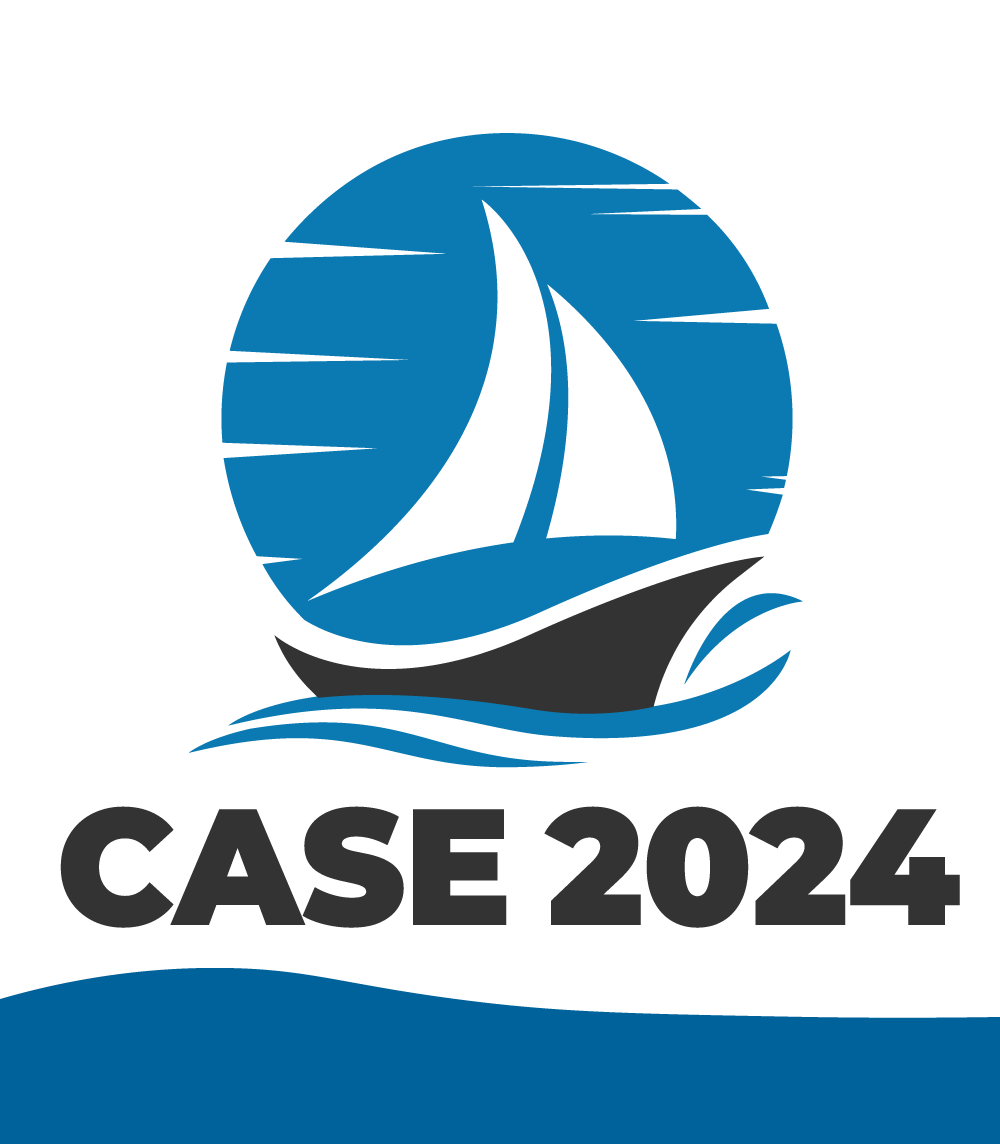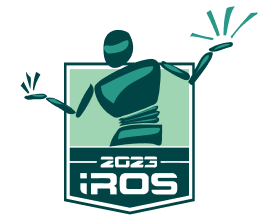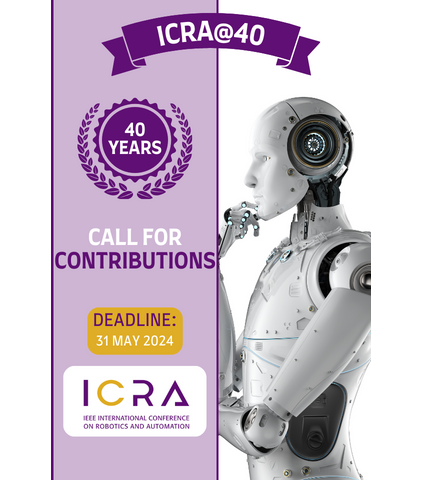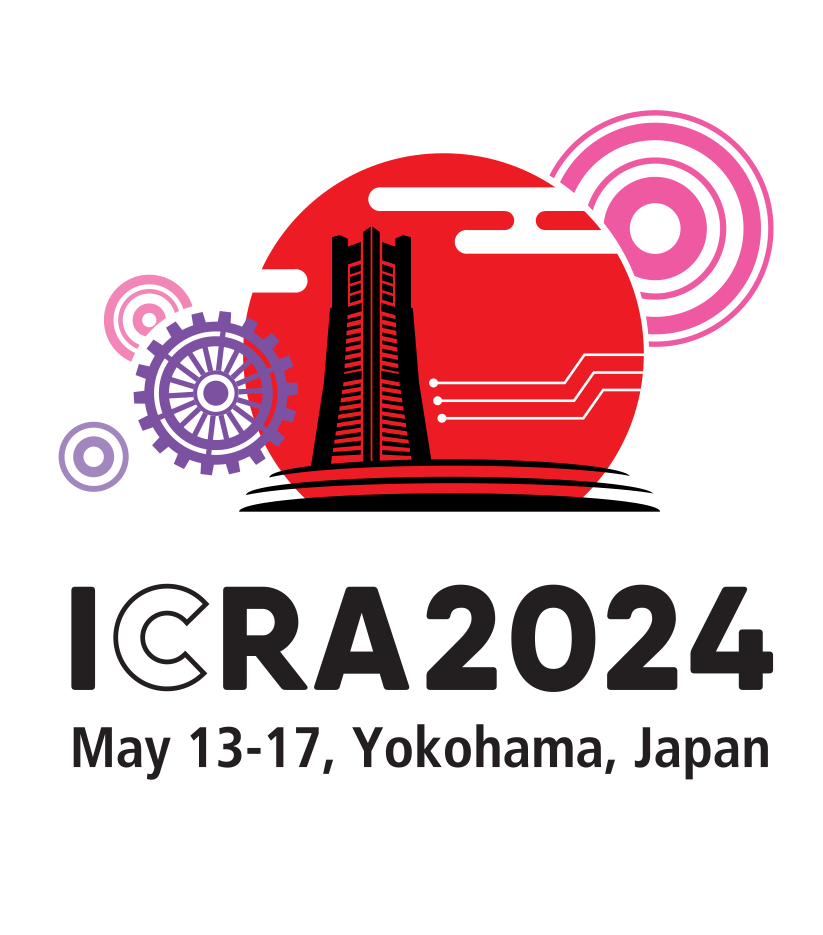Latest News
IEEE/IFR Innovation & Entrepreneurship Award
for Outstanding Achievements in Commercializing Innovative Robot and Automation Technology
DEADLINE FOR APPLICATIONS: 15 MARCH 2020
https://www.ieee-ras.org/awards-recognition/society-awards/
The purpose of this award is to highlight and honor the achievements of the inventors with value creating ideas and entrepreneurs who propel those ideas into world-class products. This is a key element to the continuing success of robotics and automation today. Active infusion of innovation and entrepreneurship into technological advancement is regarded critical at this juncture to strengthen a healthy balance between research and practice as well as a healthy growth of industrial and commercial sectors in robotics and automation. In a joint event the IEEE Robotics and Automation Society and the International Federation of Robotics will therefore recognize and honor outstanding achievements of entrepreneurs in the commercialization of innovative robotic and automation technology.
These achievements will be recognized in a specially organized IEEE/IFR Joint Forum on Innovation and Entrepreneurship in Robotics and Automation, which is being held in conjunction with the International Symposium on Robotics. The selected finalists will have the opportunity to present their story of the genesis of a successful innovative product in robotics and automation from its very inception to the final state of commercialization in a series of plenary lectures. The ultimate winner will be chosen by an evaluation board consisting of distinguished individuals from industry and academia. A prestigious plaque will be awarded to each finalist and a US$ 2,000 prize will be awarded to the winner.
Applications should describe the original work that has been translated into a commercial success. The application must include statements regarding:
|
|
Applications should not exceed a maximum length of 5 pages. Product descriptions and public relation material will not be accepted as an application. References and links to online material are permitted.
Submission of Applications
Please send as PDF document (< 6 MB) no later than March 15, 2020 either to secretariat@ifr.org or to RAS@ieee.org.
Schedule
15 March 2020- Submission of applications
10 April 2020- Evaluation of applications and selection and notification of finalists
17 June 2020- Plenary lectures of the finalists and selection of the winner at the IEEE/IFR Joint Forum on Innovation and Entrepreneurship in Robotics and Automation
17 June 2020- IERA Award Presentation at the ISR Gala Dinner
For inquiries please contact:
Dr. Robert O. Ambrose
Vice President for Industrial Activities of the IEEE Robotics and Automation Society
phone: +1 281 244 5561 e-mail: robert.o.ambrose@nasa.gov

The 2020 IEEE 6th World Forum on Internet of Things (WF-IoT 2020 is the premier conference of the IEEE IoT Initiative This conference is attended by the most active participants from research community, government and public sector, small business, multinational corporations and industry. The technical papers, presentations and events at this conference are focused on contributions to nurture, cultivate, enhance and accelerate the adoption of IoT technologies and applications for the benefit of humanity. WF-IoT 2020 will include a multi-dimensional program of technical research papers, presentations, panels, workshops, tutorials and industry forum on the latest technology developments and innovations in many fields and disciplines that drive the utility and vitality of IoT solutions and applications. WF-IoT 2020 will be held at New Orleans, the Jazz music capital of the world.
The WF-IoT 2020 seeks submissions of technical papers and proposals that address, but are not limited to, the following topics:
- RFID, Sensors, and Actuators
- Power and Energy for IoT
- IoT Enabling Technologies
- Computing Platforms for IoT
- Data Acquisition, Storage and Management for IoT
- IoT Applications and Services
- Security and Privacy for IoT
- IoT Social Impact
- Design, Integration and Testing Methods
- 5G and IoT Networks
- IoT Data Analytics
- Signal Processing for IoT
- IoT Experimental Results and Deployment Scenarios
- Machine Learning for IoT
Conference content will be submitted for inclusion into IEEE Xplore as well as other Abstracting and Indexing (A&I) databases.
WF-IoT 2020 will include a rich, industrial-based program presenting the latest results and future strategies of IoT applications. Speakers will address the following Verticals: Smart Cities; Oil, Gas and Energy; Agriculture; Health Care; Environment; and Industrial IoT, and the following Topicals: AI and Machine Learning; Security and Cyber Security; Sensors and RFID; Computing Infrastructure; Data and Data Engineering; and Communication, Connectivity, and Networking.
WF IoT 2020 will also feature the following:
> Special Sessions on Emerging Technologies
> Tutorials on Research and Industrial Hot Topics
> PHD/MSC Forum
> Demos and Exhibits
> Student Paper Contest
The submission site: https://epapers.org/wf-iot2020
New Orleans is one of the world’s most fascinating cities – it’s home to a truly unique melting pot of culture, food and music Come down and experience New Orleans, one of America’s most culturally and historically rich destinations. The official New Orleans tourism guide, NewOrleansOnline com, is full of information about things to do, where to eat and more.
The conference venue is the Hilton New Orleans Riverside, which is located on the banks of the Mississippi River It serves as the perfect central location for business and pleasure. It’s attached to the Outlet Collection at the Riverwalk and just a few blocks from the French Quarter.
Congratulations to the following 2019 IEEE International Conference on Automation Science and Engineering (CASE 2019) Award Recipients! Winners were announced and honored during the Awards Ceremony which took place on 24 August 2019 in Vancouver, Canada. Presentations made by CASE Award Chair Leyuan Shi and Steering Committee Chair Bengt Lennartson.
IEEE-CASE Best Conference Paper Award
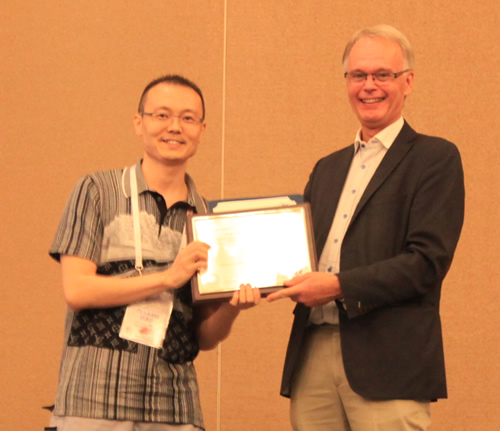
The award is given annually to the author(s) of a paper presented at the IEEE International Conference on Automation Science and Engineering (CASE) that contributed to the notable advancement in automation research: abstractions, algorithms, theory, methodologies, and models that improve efficiency, productivity, quality, and reliability of machines and systems operating in structured environments over extended periods, or that improve the explicit structuring of environments where machines and systems operate.
“Selecting the Optimal System Design under Covariates”
Siyang Gao, Jianzhong Du, Chun-Hung Chen
IEEE-CASE Best Application Paper Award
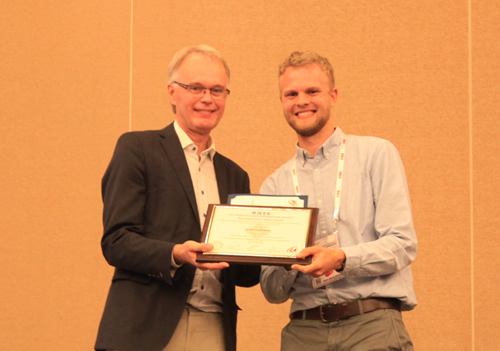
Best application paper presented at the International Conference on Automation Science and Engineering (CASE)
“Tool-center-point control of a flexible link concrete pump with hydraulic limitations using quadratic programming”
Julian Wanner, Oliver Sawodny
IEEE CASE Best Student Paper Award
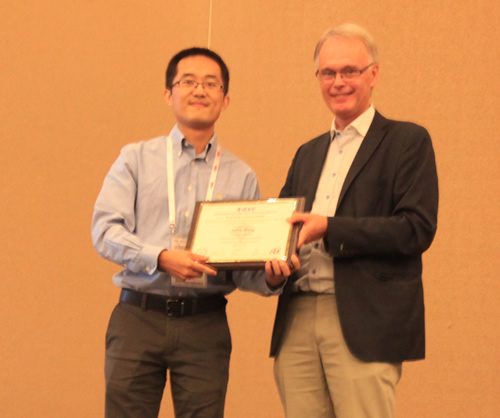
This award recognizes the best paper authored primarily by a student and presented by the student at the IEEE International Conference on Automation Science and Engineering (CASE). The award is supported by his academic family to honor Professor Yu-Chi (Larry) Ho, a Past President of the IEEE Robotics and Automation Council, which later became the IEEE Robotics and Automation Society.
“Real-time control for large scale additive manufacturing using thermal images”
Feifan Wang, Feng Ju, Kyle Rowe, Nils Hofmann
IEEE CASE Healthcare Automation Award - NEW THIS YEAR!
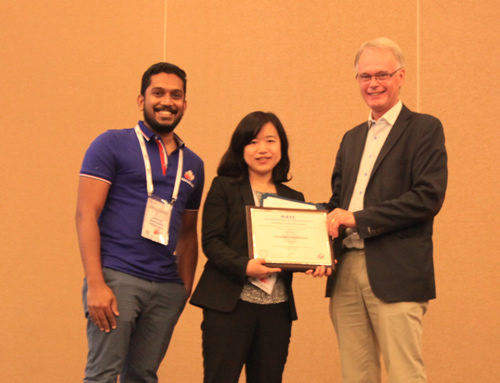
This award recognizes the best paper in Healthcare Automation presented at the IEEE International Conference on Automation Science and Engineering (CASE). The purpose is to promote research and development of automation techniques and application in healthcare, which is an area with promising opportunities in automation research and significant impact to economy and society.
"Evaluation of E-Consults in Healthcare Delivery"
Aditya Mahadev Prakash, Qiaochu He, Xiang Zhong
Congratulations to the following Authors for their outstanding achievement as recipients of IEEE Transactions on Automation Science & Engineering Best Paper Awards!
The following awards were announced and presented at the 2019 IEEE International Conference on Automation Science and Engineering (CASE 2019).
22-26 August 2019, Vancouver, BC, Canada
IEEE Transactions on Automation Science and Engineering Best Paper Award
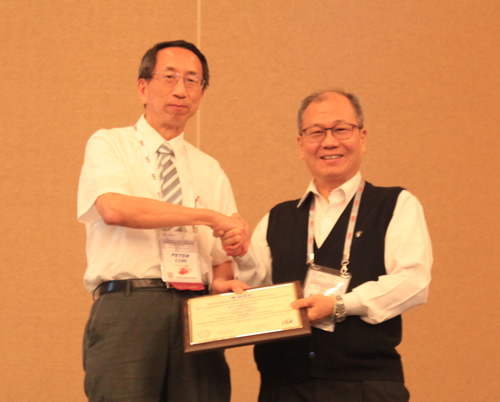
Congratulations to the following winners of the 2019 IEEE Transactions on Automation Science and Engineering Best Paper Award. This award honors the best paper printed in the IEEE Transactions on Automation Science and Engineering in the previous year, and will be presented by Michael Wang - Editor in Chief.
“Chiller Plant Operation Optimization: Energy-efficient Primary-only and Primary-secondary Systems”
Danxu Zhang, Peter B. Luh, Junqiang Fan, Shalabh Gupta
vol. 15, no. 1, pp. 341-355, 2018
IEEE Transactions on Automation Science and Engineering Best New Application Paper Award
Congratulations to the following winners of the 2019 IEEE Transactions on Automation Science and Engineering Best New Application Paper Award. This award honors the best paper printed in the IEEE Transactions on Automation Science and Engineering in the previous year, and was presented by Michael Wang - Editor in Chief.
“Correctness Guarantees for the Composition of Lane Keeping and Adaptive Cruise Control”
Xiangru Xu, Jessy W. Grizzle, Paulo Tabuada, Aaron D. Ames
vol. 15, no. 3, pp. 1216-1229, 2018
How to banish manels and manferences from scientific meetings.

A Nature analysis finds that several fields of science are moving away from male-dominated conferences and panels — but it’s easy to slip back into old habits. Nancy Amato, RAS Vice President for Member Activities, discusses how the Society is working to address diversity issues. Some progress has been made, but there is more work to be done.
To read full article see: https://www.nature.com/articles/d41586-019-02658-6
IEEE 6th World Forum on Internet of Things (WF-IoT 2020)
5-9 April 2020 // New Orleans, Louisiana, USA
https://wfiot2020.iot.ieee.org/

The 2020 IEEE 6th World Forum on Internet of Things (WF-IoT 2020) is the premier conference of the IEEE IoT Initiative. Every year the conference is attended by hundreds of most active participants from research community, government and public sector, small business, multinational corporations and industry. The technical papers, presentations and events at this conference are focused on contributions to enhance and accelerate the adoption of IoT technologies and applications for the benefit of humanity. WF-IoT 2020 will include a multi-dimensional program of technical research papers, expert presentations, panels, workshops, tutorials and industry forum on the latest technology developments and innovations in many fields and disciplines that drive the utility and vitality of IoT solutions and applications.
WF-IoT 2020 seeks submissions of technical papers and proposals that address, but are not limited to, the following topics:
- RFID, Sensors, and Actuators
- Power and Energy for IoT
- IoT Enabling Technologies
- Computing Platforms for IoT
- Data Acquisition, Storage and Management for IoT
- IoT Applications and Services
- Security and Privacy for IoT
- IoT Social Impact
- Design, Integration and Testing Methods
- 5G and IoT Networks
- IoT Data Analytics
- Signal Processing for IoT
- IoT Experimental Results and Deployment Scenarios
- Machine Learning for IoT
Accepted papers that are presented at the conference will be included in the conference proceedings and will be published in IEEE Xplore®. All papers must be submitted through the conference web site.
The conference presentations will address the following Verticals: Smart Cities; Oil, Gas and Energy; Agriculture; Health Care; Environment; and Industrial IoT, and the following Topicals: AI and Machine Learning; Security and Cyber Security; Sensors and RFID; Computing Infrastructure; Data and Data Engineering; and Communication, Connectivity, and Networking. WF IoT 2020 will also feature the following:
- Special Sessions on Emerging Technologies
- Tutorials on Research and Industrial Hot Topics
- PHD/MSC Forum
- Demos and Exhibits
- Student Paper Contest
Submit your paper or proposal today to be part of this premier IoT conference and to experience New Orleans, the Jazz music capital of the world, and one of the world’s most fascinating cities of rich culture, great food and music.
SUBMISSION INFORMATION
Submission Guidelines: https://wfiot2020.iot.ieee.org/wfiot-2020/authors-proposers/
Submission Site: https://epapers.org/wf-iot2020
Submission Deadline: 3 November 2019
For further information, please see https://wfiot2020.iot.ieee.org/

Call for Nominations: Editors and Associate Editors of IEEE Trans. on Automation Science and Engineering (T-ASE), Deadline 1 October 2019
The IEEE Trans. on Automation Science and Engineering (T-ASE, http://www.ieee-ras.org/publications/t-ase) is soliciting nominations for multiple Editors and Associate Editors, with a term beginning January 2020. Editors and Associate Editors play important roles in ensuring the quality of publications and in guiding the general development of the Transactions, in multiple capacities including implementing reviews of manuscripts according to IEEE guidelines, soliciting emerging topical articles for special issues, guiding the overall direction of the publication, and providing feedback from the readership. Active participations are expected in the annual IEEE Conference on Automation Science and Engineering (IEEE CASE) and in at least one of the two editorial board meetings held annually in conjunction with the IEEE International Conference on Robotics & Automation (ICRA) and IEEE CASE. Furthermore, it is mandatory to participate in T-ASE Editorial Board Workshop (to be held on 20 August 2020 at CASE 2020 in Hong Kong).
The term of an Editor or Associate Editor normally consists of a one-year probation period followed by four years (for Editor) or two years (for Associate Editor) of additional service if performance is satisfactory. Candidates should have a strong technical background in T-ASE related areas and excellent English language skills. Previous publications in T-ASE and participations in IEEE CASE are strongly preferred.
Nominations should include a resume (not to exceed three pages), a complete list of journal publications, previous experience with publications as a reviewer or in editorial capacities, and areas of technical expertise. Please submit nominations in a single pdf file to Editorial Assistant Rebecca Hytowitz, (r.hytowitz@ieee.org) or T-ASE Editor-in-Chief Michael Wang (t.ase.eic.wang@gmail.com), by 1 October 2019.The Deadline to vote is 16 October 2019!
RAS members are voting to elect six new RAS Administrative Committee members to serve 3-year terms beginning 1 January 2020. All RAS members (Graduate Student Members and above) have received voting instructions, the biographies, and statements of the candidates by email. RAS membership must be active as of 15 August 2019 to be eligible to vote. Members who do not have valid emails registered with the IEEE or have opted not to receive e-mail from IEEE, have received their election materials by post.

Use https://eballot4.votenet.com/IEEE to access the ballot and cast your vote now. If you do not remember your password, you may retrieve it on the voter login page. Voting must be completed no later than 16 October 2019. Any returns received after this date will not be counted. The online voting site will close at 4:00 pm Eastern Time.
Candidate bios and position statements are here: https://www.ieee-ras.org/about-ras/governance/administrative-committee/election-candidates
If you have any questions about the IEEE Robotics and Automation Society voting process, please contact ieee-rasvote@ieee.org or +1 732-562-3904.
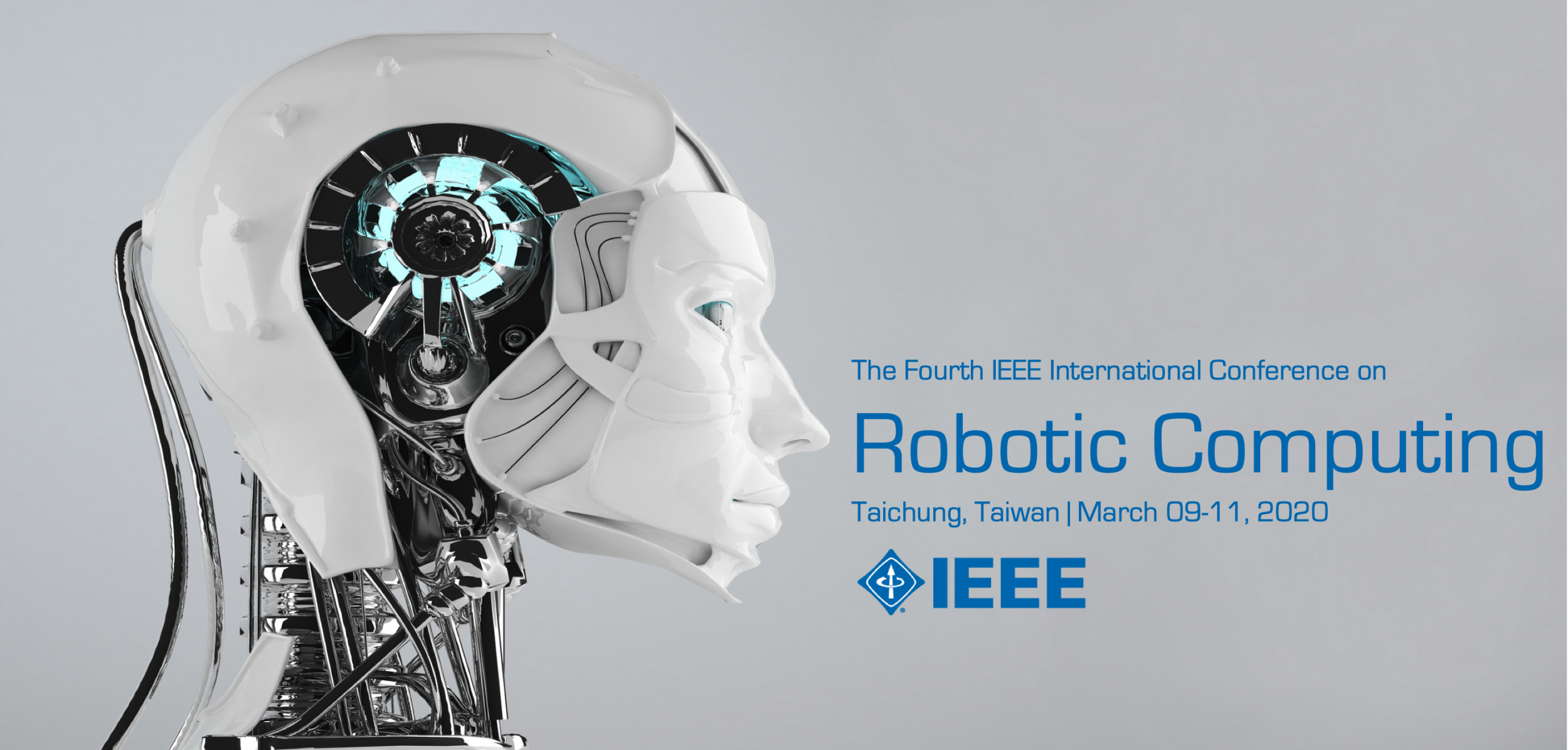
The boundaries between Computer Science and Robotics are continuing to be softened. On one hand computers are continuing to be humanized and a large number of cyber-physical systems are being developed to act upon the physical world. On the other hand the robotic community is looking into the robots of the 21st century that are versatile computing machines with high social impact potential, such as enhance transportation safety, reduce agricultural pesticide use, and improve public safety and crime-fighting efficacy, among other things. The barriers that restrain their diffusion significantly correlate to the complexity of developing their software control systems, which must be reliable, maintainable, intelligent, and safe.
Robotic Computing (RC) addresses the synergetic interaction of computing technologies and robotic technologies. The synergy between Robotics and Computer Science is both realistic and strategic. Their mutual benefit is to make it possible to build and evolve new robotic systems, to reduce their development cost, and to enhance their quality.
Topics related to Computer Science
- Formal methods for analysis and design
- Software architectures
- Middleware infrastructures
- Model-driven engineering
- Component-based engineering
- Software product line engineering
- Data, ontology, and knowledge engineering
- Autonomic computing
- Natural language understanding
- Service oriented computing
- Cloud computing
- Semantic computing
- Multimedia computing
- Internet of Things
- Virtual reality
- Computer security
Topics related to Robotics
- RAMS abilities of robotic systems
- Hardware modeling and abstraction
- Resource awareness
- Sensor fusion, integration
- Place recognition, localization
- Object recognition, tracking
- Scene interpretation
- Robot cognition
- Manipulation, grasping
- Robot kinematics, dynamics
- Motion planning, control
- Navigation
- Task planning, monitoring
- Human-robot Interaction
- Robot simulation
- Multi-robot systems
The Conference is also inviting innovative contributions that discuss the future of the field including, but not limited to:
- What are the challenges to robotic computing?
- What are the main unresolved theoretical and/or methodological controversies?
- What are the stakeholders’ (e.g., industries, public bodies, educators) research and development problems?
- What can be learned from other disciplines and what can they learn from robotic computing?
- What is the real world experience of Robotic Computing over the past 10 years, and how might it continue to evolve as we look toward the next decade?
SUBMISSIONS
Authors are invited to submit an 8-page (full), 4-page (short), or 6-page (industry) technical paper manuscript in double-column IEEE format following the guidelines available on the IRC2020 web page. The conference proceedings will be published by IEEE Computer Society Press. Distinguished quality papers presented at the conference will be selected for the best paper/poster awards and for publication in internationally renowned journals.
IMPORTANT DATES
16 September 2019: Workshop proposal submission deadline
27 September 2019: Workshop proposal acceptance notification
18 October 2019: Paper submission deadline
2 December 2019: Workshop paper submission deadline
16 December 2019: Paper acceptance notification
24 January 2020: Camera ready and registration deadline
9- 11 March 2020: Conference
Financial co-Sponsorship by IEEE RAS
The IEEE Robio 2019 (The 2019 IEEE International Conference on Robotics and Biomimetics) conference will take place in the beautiful historical city of Dali, Yunnan Province, China from 6-8 December 2019:
Dali is famous for its natural beauty and its diversity in culture and people. The natural beauty of Erhai Lake and Cang Mountain in Dali are breathtakingly astounding. The Robio 2019 conference promises to offer the participants a great experience with excellent technical and social programs. High quality papers reporting original research results and innovations in all aspects of robotics, biomimetics, automation, artificial intelligence, computer vision, image processing, sensors, and all related areas as well as their applications are invited.
Contributed Papers: Papers are solicited in all areas mentioned above. All papers must follow the IEEE Xplore® PDF format for IEEE Xplore database and EI index. Organized Sessions: Proposals for organized sessions focused on new and innovative topics and applications are welcome for submission via the conference secretariat.
Best Paper Competition: All the submitted papers will be automatically considered and evaluated for the following best paper competitions:
- Best Conference Paper Award
- Best Student Paper Award
- T.J. Tarn Best Paper in Robotics Award
- Best Paper in Biomimetics Award
- R\pi Labs Best Paper in AI in Robotics Award
Important Dates:
30 Sep. 2019: Submission of full PDF papers & OS proposals
31 Oct. 2019: Notification of paper acceptance decisions
15 Nov. 2019: Submission of final papers and author registration
Financially co-sponsored by IEEE RAS
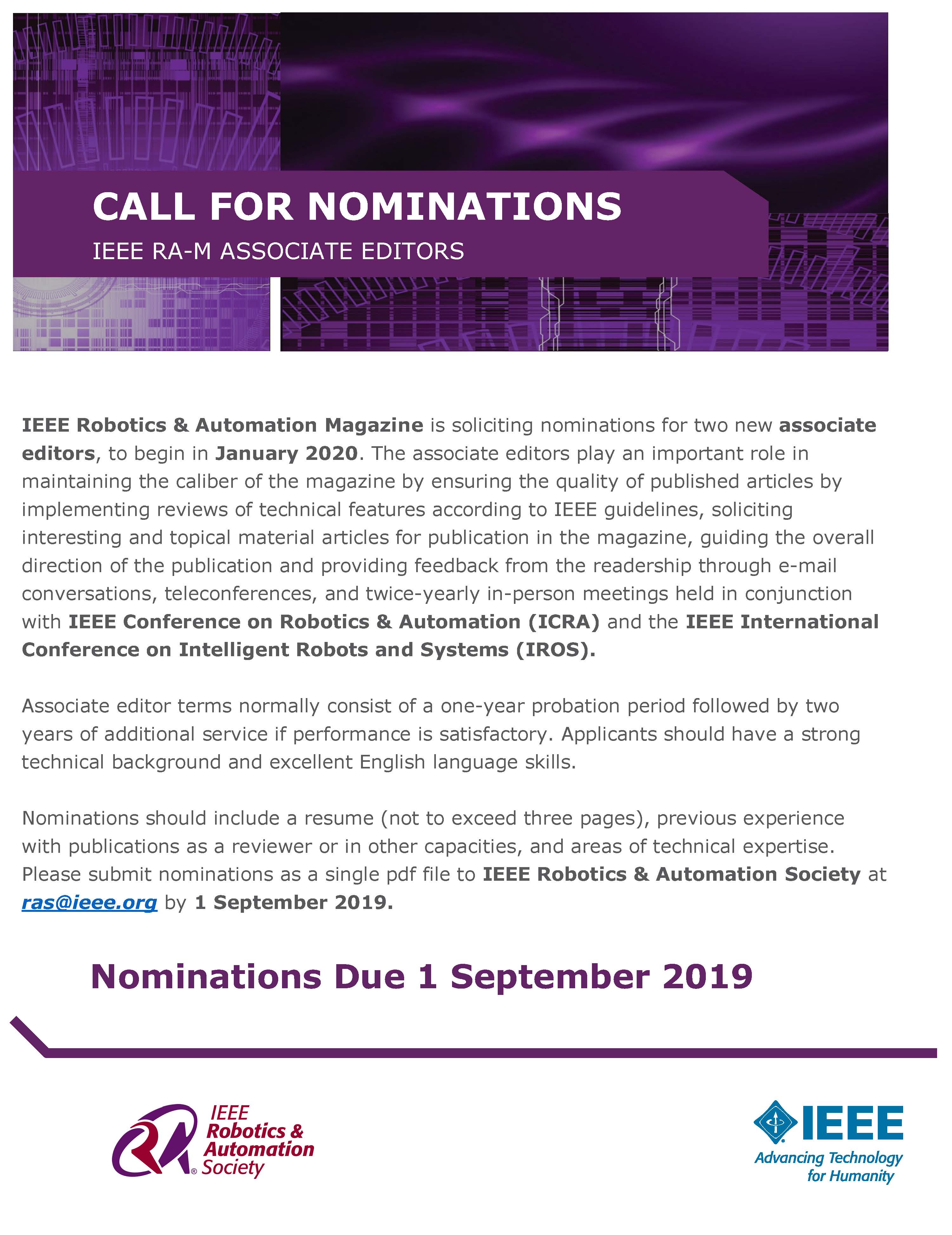
Please submit nominations as a single pdf file to IEEE Robotics & Automation Society at ras@ieee.org by 1 September 2019.
The 15th Innovation and Entrepreneurship Award in Robotics and Automation (IERA) goes to the “UVD Robot” by Blue Ocean Robotics. The collaborative robot autonomously drives around hospitals while emitting concentrated UV-C light to eliminate bacteria and other harmful microorganisms. As a result, hospitals can guarantee a 99.99% disinfection rate – reducing the risk for patients, staff and relatives of contracting dangerous infections.
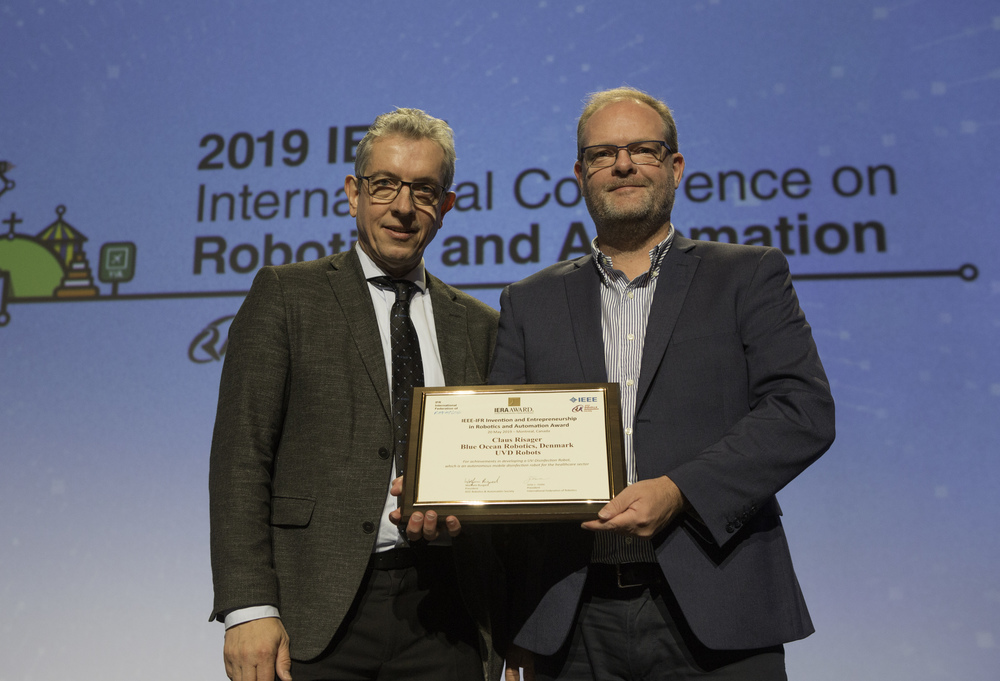
Wolfram Burgard, President IEEE RAS (left) and Claus Risager, CEO Blue Ocean Robotics (right) at the IERA Award 2019 © IEEE RAS
“The UV disinfection robot by Blue Ocean Robotics shows that robotics has a limitless potential of being applied in new environments,” said Arturo Baroncelli, former President of the International Federation of Robotics which co-sponsors the IERA award. “The combination of ‘classical’ mechatronic disciplines - typical of robotics – with the know-how of medicine and pharmacy is fantastic evidence of this path of progress. The IFR is happy to recognise and support this virtual trend.”
“We are incredibly proud of winning the IERA Award 2019 for a ground-breaking product,” said Claus Risager, CEO of Blue Ocean Robotics. “Everyone can feel safe in rooms that have been disinfected by the robot. Our UVD Robot not only reduces the risk of patients contracting hospital-related infections, but also to a high extent visitors and hospital staff.” Blue Ocean Robotics is a Danish manufacturer of service robots for the healthcare, hospitality, construction and agricultural sectors based in Odense. The UV disinfection robot is sold by its subsidiary, UVD Robots.
UVD Robot disinfects all contact surfaces autonomously
Infections acquired in hospitals cause significant costs in the healthcare sector: In the EU, these costs amount to 7 billion euros. The source of infections can be other patients or staff and even equipment or the hospital environment. The UVD Robot drives around and positions itself autonomously in relation to its surroundings. The machine treats surfaces in a hospital ward with light from several angles and up close. The robot disinfects all contact surfaces, stopping at predefined hotspots that require a longer time of exposure. The UV disinfection robot does not replace the manual cleaning process - it is designed as a complimentary activity and always works in enclosed spaces.
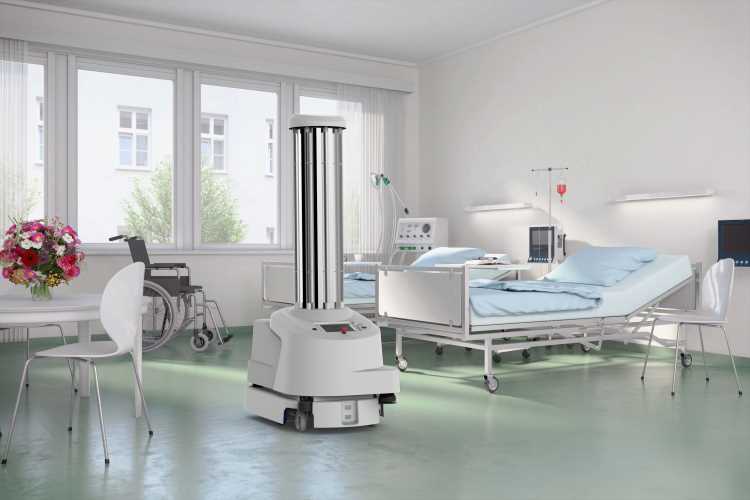
“UVD Robot” by Blue Ocean Robotics drives autonomously and eliminates bacteria and other harmful microorganisms in hospitals © Blue Ocean Robotics
Collaborative robot contains number of safety features
As exposure of UV-C light toward humans should be avoided, the robot contains a number of safety features: for example, a tablet which is placed on the door of the patient room acts as a motion sensor – it automatically disengages the UV-C light if someone wants to enter the room.
The technology has been developed in cooperation with leading hospitals in Scandinavia. First sales have been made in the Middle East and Asia. In future, the robot can also be applied to other environments requiring diligent disinfection such as food production or laboratories.
IERA Award honors collaboration of science and industry
The IERA Award highlights and honors the achievements of innovators with value creating ideas and entrepreneurs who propel those ideas into world-class products. The IEEE Robotics and Automation Society (IEEE/RAS) and the International Federation of Robotics (IFR) jointly sponsor the award - underlining their determination to promote stronger collaboration between science and industry in robotics.
Don't wait! The Award Nomination Deadline is Thursday,1 August.

Who are Leaders in the robotics and automation field? Who should be honored with a prestigious IEEE RAS Award? Consider nominating them! But hurry, the deadline for IEEE Robotics & Automation Society Award nominations is midnight (US EST) 1 August 2019.
Details for each award, including eligibility, nomination requirements and lists of previous recipients, may be found here:
www.ieee-ras.org/awards-recognition/society-awards
We would like to welcome the newest Robotics and Automation Society Technical Committee to the group- Verification of Autonomous Systems, headed by Dejanira Araiza-Illan, Michael Fisher, and Signe Redfield.
The robotics and autonomous systems communities have recently seen a significant and rapid increase in both the development of robots for commercial use and in interest in using robots in a wide range of novel applications. As these robotic systems, vehicles, and even embedded devices move towards much greater autonomy, we will require techniques for verification that provide much higher confidence than usual. Consequently, the analysis and test processes used for traditional systems must be significantly enhanced to provide increased confidence in this next wave of autonomous systems. The need for well understood and effective verification techniques will become vital as we move to commercial applications such as “driverless cars”, incorporate complex AI technologies, and utilize these systems in safety-critical scenarios.
There are a growing number of research developments concerning the verification of complex systems that can all impact upon this problem. These are clearly of relevance for designing, constructing and deploying autonomous systems but also have importance to Psychology (e.g. social robotics), Philosophy (e.g. machine ethics), and Law (e.g. certification). Furthermore, constructing autonomous systems without strong behavioral guarantees can lead to serious outcomes, and may consequently hold back the widespread adoption of these systems. As the research is fragmented and often not well publicized, this TC will coalesce this activity, drive the research agenda forward, and instill the necessity for verification firmly within industry, government, and the public.
This technical committee is concerned with the development of tools and techniques to verify autonomous systems with the following topics of interest:
- Tools and techniques for verification at design time
- Tools and techniques to support the specification of autonomous systems, and their tasks and behaviors, such as logics, languages, mathematical frameworks, and combinations of all these
- Tools and techniques for verification at development stage
- Tools and techniques for testing, modeling and simulating autonomous systems, both on their own and within their environment. For example, dedicated automated or interactive computer programs, mathematical and heuristic procedures, and best practices on modelling concerning behavior of autonomous systems and their environment for analysis
- Verification standards and certification processes for autonomous systems
- Tools and techniques for verification at run-time, such as sensing and reacting feedback loops with hardware and software, mathematical and heuristic procedures, qualitative and quantitative analyses frameworks, and best practices
- Tools and techniques for rigorous analysis of system properties such as safety, reliability, security, and ethical constraints. For example, software testing, system testing (hardware-software-environment), simulations, experiments in the lab, user evaluation studies, and combinations of all of these with real and simulated elements
Goals and objectives of this Technical Committee are:
- Link researchers and practitioners in the field of Verification of Autonomous Systems together
- Publicize events, initiatives, researchers and resources that target the Verification of Autonomous Systems worldwide
- Provide a detailed roadmap of existing resources and research as well as future areas that need to be tackled (which can then impact on funding organizations worldwide)
- Develop and promote leading workshops and international conferences focused on this key topic
For more information on workshops and events or to register for the emailing list, click here.
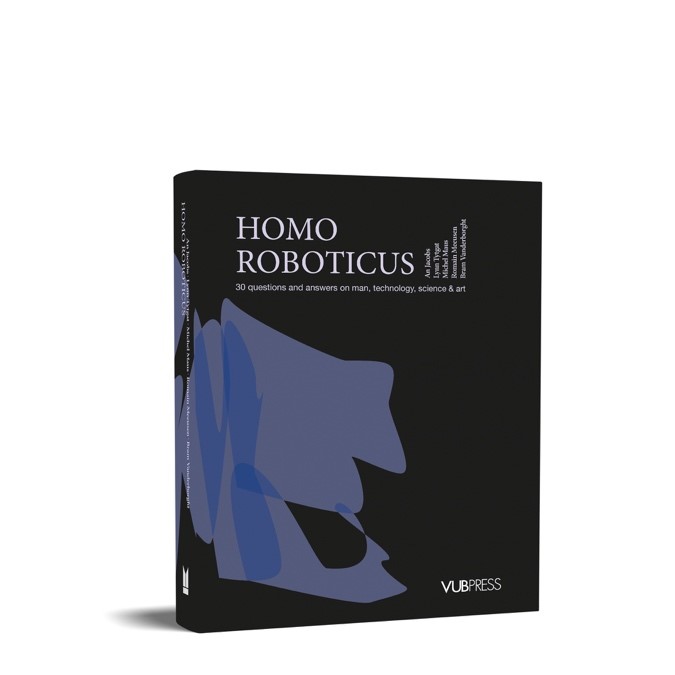
Written By: Bram Vanderborght, An Jacobs, Michel Maus, Lynn Tytgat and Romain Meeusen
History teaches us that technology has the power to strengthen economic growth and transform societies. This will be more than ever the case with the emerging robotics and artificial intelligence. For current and future societal challenges, technology will be an important part of the problem-solving process for example to face the aging population, rising health costs, the need for healthier and better work, the environment, climate change, mobility and the energy issue. At the same time, new and very important challenges are emerging, which is to ensure that robotization and artificial intelligence continue to benefit people and society. To achieve this objective, in the book Homo Roboticus 10 policy recommendations for an inclusive robot agenda are proposed.
As Darwin was well aware, it’s not the strongest animal that survives, but the one that is best fit for its environment. This means we will have to continue adapting to the emerging trend of robotization. Let us not underestimate the capabilities of mankind. We have millions of years of evolution behind us, evolution which robots are yet to undergo. Both cognitively and physically, the human ‘machine’ is much more impressive and complex than its robotic counterpart. Yet our bodies also have their limitations and we face social challenges.
English version of the book is now available on Amazon.
More info and book: www.homo-roboticus.be
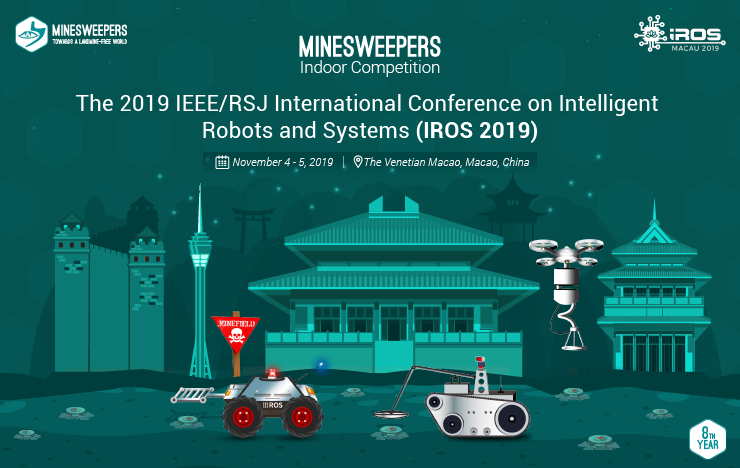
Indoor Version
The 2019 IEEE/RSJ International Conference on Intelligent Robots and Systems (IROS 2019)
4-5 November, 2019 in Macau, China
http://www.landminefree.org/indoor
Competition Categories
- Industrial Category: for professional companies and start-ups where metallic and non-metallic objects with different dimensions and profiles are available in the competition arena and landmine detection, landmine imagining, minefield mapping and landmine disposal are required.
- Academia Category: for undergraduate and postgraduate university students where only, metallic objects are available in the competition arena and landmine detection, minefield mapping and landmine disposal are required.
- Juniors Category: for elementary and high school students where only metallic objects are available in the competition arena and only landmine detection and landmine disposal, are required.
Haptics for interactive touch surfaces, also known as surface haptics, is a new area of research in the field of haptics. The goal of surface haptics s to generate haptic effects on physical surfaces such as the touch surfaces used in mobile cell phones, tablets, kiosks, information displays, and front panels of new generation home appliances and cars.
Topics of interest include:
- Studies on the design and evaluation of various actuation technologies (vibrotactile, electroadhesive, ultrasonic, electromagnetic, etc.) for displaying haptic feedback through touch surfaces
- Tactile rendering algorithms for displaying virtual shapes and textures on touch surfaces
- The mechanics and neuroscience of contact between the human fingerpad and touch surfaces displaying haptic feedback
- Studies on surface haptics investigating human perception, cognition, attention, new HCI paradigms, and user interface design and experience (UIX)
- Applications of surface haptics in consumer electronics, the automotive industry, home appliances, designing aids for the visually impaired, online shopping, gaming and entertainment, data visualization, education, tele-touch, and art appreciation.
Submission
Visit here to view formatting requirements, and submit your paper click here When uploading your paper please select the appropriate special issue title under the category ? Manuscript Type.?
Important Dates
Guest Editors
Prof. Cagatay Basdogan, Koc University, cbasdogan@ku.edu.tr
Prof. Seungmoon Choi, Postech, choism@postech.ac.kr
Prof. Frederic Giraud, University of Lille, frederic.giraud@univ-lille.fr
Prof. Vincent Levesque, ETS, vincent.levesque@etsmtl.ca
Call For Papers- 15th Annual ACM/IEEE International Conference on Human-Robot Interaction (HRI 2020)
15th Annual ACM/IEEE International Conference on Human-Robot Interaction (HRI 2020)
http://humanrobotinteraction.org/2020/
23-26 March, 2020 in Cambridge, UK
Full Paper Submission Deadline: 1 October, 2019
************************************************************************
The ACM/IEEE International Conference on Human-Robot Interaction is a premier, highly-selective venue presenting the latest advances in Human-Robot Interaction. The 15th Annual HRI conference theme is "Real World Human-Robot Interaction". The conference seeks contributions from a broad set of perspectives, including technical, design, behavioural, theoretical, methodological, and metrological, that advance fundamental and applied knowledge and methods in human-robot interaction. Full papers will be archived in the ACM Digital Library and IEEE Xplore Digital Library.
**Full Papers: Due 1 October 2019**
Full papers are up to eight camera-ready pages, including figures, but excluding references. Submissions longer than eight pages of content excluding references will be desk rejected and not reviewed. Accepted full papers will be published in the conference proceedings and presented in an oral session. The HRI conference is highly selective with a rigorous, two-stage review model that includes an in-person expert program committee meeting where papers are extensively discussed. As such, all submissions are expected to be mature, polished, and detailed accounts of cutting-edge research described and presented in camera-ready style. In cases of equally qualified papers, positive consideration will be given to submissions that address this year's theme, "Real-World Human Robot Interaction".
Authors are encouraged to consult the guide regarding submissions to HRI provided at: http://humanrobotinteraction.org/2020/guide-to-submission-types/
To facilitate quality interdisciplinary reviewing, and to inform reviewer selection, authors will be required to select one main theme and one optional second theme for their full paper submissions.
The HRI 2020 conference has five themes: User Studies, Technical Advances, Design, Theory and Methods, and Reproducibility (New for 2020). Papers may have overlap between themes, but authors are encouraged to consider the main contribution of the work using this brief rule of thumb:
- • Human Robot Interaction User Studies: The primary contribution is human-focused, e.g., how humans perceive, interact with, or otherwise engage with robots.
- • Technical Advances in Human Robot Interaction: The primary contribution is robot-focused, e.g., systems, algorithms, or computational methods supporting HRI.
- • Human-Robot Interaction Design: The primary contribution is design-focused, e.g., new morphologies, behavior paradigms, or interaction capabilities for robots.
- • Theory and Methods in Human-Robot Interaction: The primary contribution is methodology-focused, e.g., fundamental HRI principles beyond individual interfaces or projects, new theoretical concepts in HRI, etc.
- • Reproducibility of Human-Robot Interaction: The primary contribution is science-focused, e.g., Reproduces, Replicates, or Re-creates prior HRI work (or fails to), provides new HRI artifacts (e.g., datasets, software), etc.
Authors are encouraged to review the extended call for papers on the conference website for more information regarding the themes, submission guidelines, etc.: http://humanrobotinteraction.org/2020/full-papers/
HRI 2020 PC Chairs
-------------------------------
Hatice Gunes, University of Cambridge, UK
Laurel Riek, University of California San Diego, USA
The 7th International Conference on Control, Mechatronics and Automation will be held in Delft, the Netherlands on November 6-8 2019. ICCMA 2019 is co-sponsored by Delft University of Technology, IEEE Control Systems Society, and IEEE Robotics and Automation Society. In 2019, TU Delft, the Netherlands welcomes the 7th edition of ICCMA. The conference provides a platform for scientists, scholars, engineers and students from universities and industries around the world to present exciting ongoing research activities, and hence fosters research relations between universities and the industry. This conference is now a well-known event worldwide and the number of paper submissions and attendees are increasing every year. The conference aims to bring together the two fields of system design and control together. Today, flexible robotics and compliant mechanism design use nonlinearities which were once considered hindrances to system design to their advantage. In addition, advances in control technology such as nonlinear control, fractional order control are advantageously being used to go beyond classical linear control and therefore increase the applicability of complex mechanisms for robotics and mechatronic systems.
Submitted papers will be peer reviewed and accepted papers after proper registration will be included in the conference proceedings published by IEEE and reviewed in the IEEE Xplore. Upon acceptance into IEEE Xplore, the papers are submitted for indexing through Ei Compendex, Web of Science (CPCI), and Scopus etc
※Keynote Speakers
▶Prof. Peter Plapper, University of Luxembourg, Luxembourg
▶Prof. YangQuan Chen MESA Lab of University of California, Merced, USA
▶Prof. Georg Schitter Vienna University of Technology, Austria
※Topics
•Design, modeling and control of precision motion systems
•Flexible robotics, Soft robotics
•Compliant mechanism
•Precision mechanism
•Mechatronic system design
•Vibration analysis and control
•Dynamics of flexible systems
•Fractional order system and control
•Nonlinear control for motion systems
•Smart automation
Symposium Dates: 3-4 October 2019
Competition Date: 3 October 2019
Organizers:
Raj Madhavan, Maryland Robotics Center, University of Maryland, College Park, MD, USA
Sara Gallagher, Do Good Institute, University of Maryland, College Park, MD, USA
Mangesh Wadegaonkar, Cayuga Growth Partners, Gaithersburg, MD, USA
Robotics, automation, and artificial intelligence (AI) technologies hold tremendous potential in addressing many of the societal challenges exemplified in the seventeen sustainable development goals of the 2030 agenda of the United Nations. The inaugural 2019 Do Good Robotics Symposium (DGRS) aims to bring together researchers, practitioners, and groups engaged in multidisciplinary and cross-cutting research and deployment of technologies for the benefit of the society and the planet. To learn more about the Symposium, please visit http://dgrs.umd.edu.
As part of DGRS’19, we are organizing a Start-up Competition (SC) in line with the main theme of the Symposium. To foster the entrepreneurial spirit and provide a platform to encourage researchers and practitioners to commercialize their ideas and prototypes that squarely place the benefit of society and the planet at its core, we are inviting the robotics and AI communities to participate in the Start-up Competition.
The event is intended to inspire, educate, enable, and empower researchers, students, young professionals, and anyone else who has an idea or a vision to develop and implement solutions to benefit humanity across the globe. You get exclusive bragging rights to winning a premier AI & robotics start-up competition in the DC-Maryland-Virginia (DMV) region and a chance to get in front of top executives and investors from the DMV area who will be part of the audience or panel of judges. Winners of the DGRSC will also get access to Do Good Accelerator programming.
DGRSC will consist of three stages:
- In the first stage, submitted applications will be down-selected to arrive at a pool of qualified applicants based on a defined set of criteria developed by the organizers (see ‘Application Form’ information below).
- This will be followed by a remote engagement stage where the selected applicants will be coached to refine their pitches based on the proposal content in concert with an expert. The coaches will then critique, and provide technical and professional assistance to fine-tune the idea/product pitches.
- The final stage will allow for the refined pitches and content to be presented in front of a panel of experts and Symposium attendees.
Who can participate?
Anyone with an idea or a prototype using robotics, AI, and/or automation technology—with societal or environmental benefit at its core—is welcome to apply. Projects that have significant or well-established start-up capital or revenue cannot be considered at this time.
How to participate?
Interested applicants should complete the Application Form. Please email completed forms to dgrs2019sc@gmail.com
Awards
Finalists will be competing for their share of up to $5,000 in prize funds.
Important Dates
- Submission of Application Forms: 30 July 2019
- Announcement of Selected Applicants: 12 August 2019
- Remote Expert Coaching: 15 August through 12 September 2019
- Final Presentations at DGRS’19: 3 October 2019




